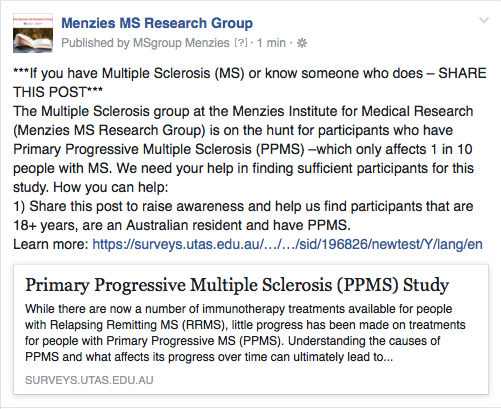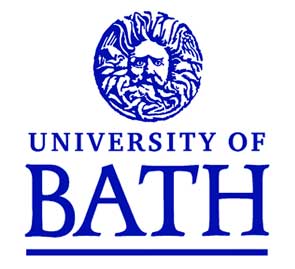ppms
Primary Progressive MS (PPMS). Please help with some important research by the Menzies Institute for Medical Research in Tasmania
What is the Aim of the Project?
While there are now a number of immunotherapy treatments available for people with Relapsing Remitting MS (RRMS), little progress has been made on treatments for people with Primary Progressive MS (PPMS). Understanding the causes of PPMS and what affects its progress over time can ultimately lead to treatments and prevention.
There is very little evidence available on how risk factors operate differently in people with PPMS compared to people with a RRMS onset, but there are some clues to suggest that there are differences. For example, the latitudinal gradient is less strong in PPMS compared to relapsing remitting MS, and a similar number of females have PPMS compared to males, while far more women than men have the relapsing remitting type of MS.
This project has two phases:
Phase 1 – The aim is to clarify which factors might contribute to the onset of PPMS. We will compare possible factors among a large group of people with PPMS to a large group of people without MS.
Phase 2 – The aim is to learn about factors that might influence the progression of PPMS over several years. We will follow a large group of people with PPMS over time.
The research team has conducted similar studies in people with MS, including all types of MS, but the number of people with PPMS (1 in 10) was not enough to conduct a separate analyses on this group. In this project we plan to include 350 people with PPMS.
Who are the Researchers for this Project?
This research is being led by Associate Professor Ingrid van der Mei and Professor Bruce Taylor who are senior and experienced researchers in the epidemiology of MS at the Menzies Institute for Medical Research, Hobart, Tasmania. Other investigators involved are Professor Anne-Louise Ponsonby from the Murdoch Childrens Research Institute in Melbourne, Professor Robyn Lucas from the National Centre for Epidemiology and Population Health in Canberra, Dr Steve Simpson (post-doctoral research fellow) from the Menzies and Associate Professor Leigh Blizzard (biostatistician) from the Menzies. The team has worked together for many years on a number of MS studies.
Who is eligible to help with this MS research?
The project is currently calling for Australian residents with PPMS, aged between 18-59 years, as our group of people without MS are of that age. However, we will extend the age range to 60 years or older for the longitudinal study in the near future. Please register your interest for the study by providing your contact details and signing the Statement of Informed Consent.
How is this project funded?
Phase 1 of the project is funded by MS Research Australia, and we are seeking funding to follow participants in the future for Phase 2 of the project.
What happens if I volunteer?
We will ask you about a range of lifestyle and other factors including for example your medical history, employment, where you have lived, and dietary intake. We will also ask you about your symptoms, quality of life and any disability caused by your MS.
In Phase 1, part of this information will be asked by two questionnaires that will be mailed to you and part of the information will be asked via a phone interview. The phone interview will take about 1 hour.
In Phase 2, we will ask for information by online questionnaires, or if you prefer via phone interview.
We will also ask you to visit a local pathology service for a blood sample. This will be used to look at markers that might be related to PPMS, including viral and vitamin D markers. Part of the blood will be used to extract DNA to examine which genetic markers might be associated with PPMS. If you have previously participated in a genetic study as part of the Australian and New Zealand Multiple Sclerosis Genetics Consortium (ANZgene), we will ask your permission to use the ANZgene data for our study.
Your blood sample and the DNA extracted from it will not, without your consent, be released for uses other than to identify genetic markers that may be associated with the onset and progression of MS.
It is possible this study may incidentally reveal that you have a predisposition to a genetic disorder important to your future heath. This is an unlikely event, but if it did occur we will advise you and offer to arrange genetic counselling.
Participation in this study is voluntary. It is completely up to you whether or not you participate in Phase 1 and Phase 2. If you decide not to participate, it will not affect the treatment you receive now or in the future. If you decide to participate, you may withdraw your consent at any time.
Reimbursement for your costs
You will not be paid for your participation in this project. However, you will be reimbursed if you require special transport as a result of participation, i.e. taxi voucher.
Possible Risks and Benefits
We cannot guarantee or promise that you will receive any personal benefits from this project other than an indirect benefit through the advancement of our knowledge of PPMS.
There are no risks to participating other than the inconvenience/discomfort of providing a blood sample. There is a small risk that this will result in some temporary bruising, redness or swelling.
Privacy, Confidentiality and Disclosure of Information
All questionnaire and phone information sourced from you will be kept secure and confidential. Only people involved in the study will have access to the study data. Data will be stored on secure servers at the Menzies Institute for Medical Research. Personal information can only be disclosed with your permission or if required by law, and you have the right to access information collected and stored by the researchers about you. Participants will not be identified in any publication. All blood samples will be privacy-coded and laboratory staff conducting the blood tests will not know names of participants.
Results of Project
The results of the project will be published in peer-reviewed medical journals. These medical journal reports, together with other information, will be used to provide up-to-date policy and advice about optimal prevention and medical care for MS.
Further Information and Ethical issues
This project will be carried out according to the National Statement on Ethical Conduct in Human Research 2007 produced by the National Health and Medical Research Council of Australia. The project has been approved by the Tasmanian Human Research Ethics Committee (Tasmania) Network (Reference Number: H0014794). If you have any concerns of an ethical nature or complaints about the manner in which the project is conducted, you may contact the Executive Officer of the Tasmanian Human Research Ethics Committee (Tasmania) Network on (03) 6226 7479 or human.ethics@utas.edu.au.
If you require further information or if you have any concerns about the project you can contact:
PPMS Study Officer
Susan Dobson ppms.study@utas.edu.au
03 6226 4269
or
The University of Bath is looking for people with Progressive Multiple Sclerosis to take part in a survey. Can you help please?
As I never tire of mentioning one of the purposes of this blog is to help promote academic surveys into various different medical conditions. I have a background in medical market research so I take a professional interest in the area.
In fact one of my key roles has been to develop research panels of people with multiple sclerosis. Interestingly (and importantly) almost all the research conducted was with people with Relapsing Remitting Multiple Sclerosis (RRMS). There seemed no interest in other kinds of MS such as Primary Progressive Multiple Sclerosis (PPMS) or Secondary Progressive Multiple Sclerosis (SPMS). If you are interested in the different types of multiple sclerosis and low the various populations fall out please have a look at some of our previous research here.
So I was delighted when Liz Sheils , a Post-Graduate researcher in psychology at the University of Bath, asked us to help with locating people who might help her with research with people with Progressive Multiple Sclerosis.
Sheils writes “The role of positive psychology in Progressive Multiple Sclerosis
You are being invited to take part in a research study to investigate the role of positive psychology in individuals with progressive multiple sclerosis. Please take time to read the following information and to consider whether you wish to take part. Contact details are provided below if you wish to discuss the research further.
What is the purpose of the study?
The aim of this study is to investigate the contribution of positive psychology (such as self-efficacy) to the explanation of anxiety and depression symptoms within progress multiple sclerosis.
Who can take part?
Participants who have been diagnosed with primary or secondary progressive multiple sclerosis.
What does the research involve?
You will be asked to complete a range of online questionnaires. They will take approximately 20-30 minutes to complete.
Do I have to take part?
You are not required to take part, participation is entirely up to you. You can withdraw from the research at any time without giving an explanation.
Will my answers be kept confidential?
All the information will be kept completely confidential and stored securely.
Results will be written up for the purpose of a dissertation and may be published, however no identifiable information will be available to see.
Contact for further information
Thank you for your time reading the research information sheet. If you have any questions or concerns please contact Liz Sheils, MSc Health Psychology Student, via email: es279@bath.ac.uk
If you would like to take part in the online survey please visit this website:
https://bathreg.onlinesurveys.ac.uk/multiple-sclerosis-positive-psychology”
Thanks very much in advance for your attention.


